Virtual Reality (VR) Therapy
Empower, Engage, Evolve: The Future of Therapy is Virtual
At Louden Group, we’re pushing the boundaries of traditional therapy. With the power of VR and the guidance of our professional therapists, we offer transformative experiences that foster growth and development. Experience the future of therapy, today.
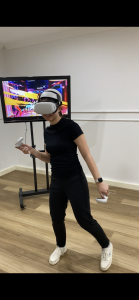
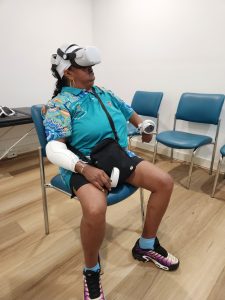
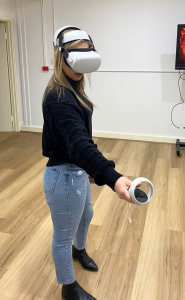
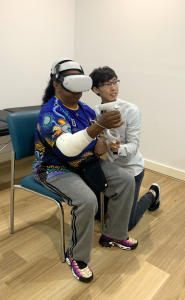
The rapidly advancing world of technology has brought to the forefront the captivating realm of Virtual Reality (VR). Far from just a digital retreat, VR therapy offers an enhanced real-world experience, serving as a dynamic platform for individuals to develop and hone various skills.
Leveraging VR for Personalised Skill Enhancement Beyond its recognised value in the entertainment sector, VR’s potential truly comes to life when facilitating personalised growth and skill development. For example, for individuals who may experience a fear of heights, VR offers a secure environment to confront and overcome such challenges. Similarly, for those seeking to enhance their communication and social skills, VR creates realistic, interactive scenarios, offering a practice space without the immediate pressures of real-life social situations.
Empowering People with Disabilities through VR For people with disabilities, VR represents a beacon of hope and a world of opportunities. The immersive environment can be tailored to address and cater to specific needs, offering targeted interventions to bolster motor skills, cognitive functions, or social interactions.
Louden Group: Leading the Way in VR Therapy With a rich history spanning 3 years in the field, Louden Group stands as a pioneer in integrating VR into therapeutic practices in Western Australia. We’ve not only embraced this technology but have seen firsthand its transformative impact on the lives of many.
Structured VR Interventions with a Personal Touch Every individual is unique, and so is our approach to their VR journey at Louden Group. All VR sessions are meticulously prescribed, monitored, and reviewed by our team of experienced therapists to ensure alignment with individual therapy goals.
Evidence-Based VR Practices At Louden Group, we seamlessly merge technology with the latest scientific research. Our commitment is to provide evidence-based therapeutic VR experiences that truly make a difference.
Embark on a transformative journey with Louden Group’s VR experiences. Together, let’s tap into the limitless possibilities of Virtual Reality.
The transformative power of Virtual Reality (VR) Therapy is gaining momentum, particularly for its therapeutic advantages for people with disabilities. Here, we break down the key benefits that make VR a game-changer in modern therapeutic practices.
1. Customised Environments Tailored to Individual Needs VR offers an unparalleled flexibility to design specific environments tailored to an individual’s needs. For people with disabilities, this means they can practise in an environment perfectly suited to their comfort and skill level, ensuring a safe space to learn and grow.
2. Enhanced Engagement through Immersive Experiences VR’s immersive nature ensures individuals remain engaged and motivated throughout their therapy sessions. The vivid and interactive nature of VR makes therapy sessions more compelling, helping individuals maintain their interest and enthusiasm.
3. Facilitating Safe Exposure and Skill Practice For people with disabilities who might find certain real-world situations challenging or overwhelming, VR offers a risk-free environment. This allows individuals to confront challenges, practise skills, or explore new environments without any physical risks or external pressures.
4. Real-Time Feedback and Progress Tracking VR platforms often come with analytics and tracking tools. This means individuals can receive immediate feedback on their performance, allowing them to understand their progress and areas of improvement. This real-time feedback is invaluable for motivation and continued progression.
5. Promotes Cognitive and Motor Skill Development Depending on the software and scenario, VR can be designed to challenge and develop cognitive functions, such as problem-solving, memory, or attention. Similarly, certain VR tools are perfect for promoting motor skill development and coordination.
6. Social Interaction in Controlled Settings For individuals with social anxieties or difficulties, VR provides opportunities to engage in social scenarios within a controlled setting. This bridges the gap between isolation and real-world social interactions, promoting social skill development and confidence.
7. Flexibility of Sessions Given the digital nature of VR, therapy sessions can be conducted in various settings – be it a clinical environment, at home, or any other comfortable space. This flexibility ensures that individuals can access therapy in a manner most convenient to them.
1. Mobility Challenges:
- Virtual Physiotherapy: For individuals with mobility challenges, VR creates a stimulating environment where they can participate in physiotherapy exercises. For instance, a person could ‘walk’ on a virtual beach, helping to improve muscle strength and joint mobility without the challenges of real sand. Dance-themed VR games encourage people to move to the rhythm, aiding in coordination, balance, and cardiovascular health. Whether it’s tennis, boxing, or even archery, virtual sports allow individuals to engage in activities that work on their motor skills, strength, and agility without needing an actual court or arena.
2. Autism Spectrum Disorder (ASD):
Social Interaction Practice: VR environments can simulate social situations, allowing individuals with ASD to practice and improve their social interaction skills without the fear of making mistakes. Here, there’s no real-world pressure or judgment, making it a safe zone to learn and grow.
- Diverse Settings: We have a range of everyday settings like schools, grocery stores, and restaurants. These virtual environments offer hands-on practice in communication, social interactions, budgeting, and many other life skills. By navigating these scenarios in a controlled, virtual space, users are better equipped to transfer and apply these skills seamlessly in real-life situations.
Job Simulation: Participants can engage in activities such as grocery shopping, cooking, or even job simulations, all within a controlled and risk-free VR environment. These real-world simulations empower individuals to practice, learn, and refine essential life and vocational skills, making the transition to actual real-life tasks smoother and more confident. VR serves as a bridge, preparing them for everyday challenges and potential career opportunities.
3. Cognitive Challenges:
Executive Functions: Someone struggling with memory can use VR games designed to practise recall and recognition. Those with executive function difficulties can navigate through games that challenge organisational or multitasking skills. Furthermore, individuals can practice life skills, within the safe confines of VR before applying them in real-world situations.
This is just the tip of the iceberg when it comes to the potential applications of VR in therapy. At Louden Group, we’re constantly exploring new avenues and methods to harness this technology for the betterment of our clients’ lives.
Initial Assessment:
Our journey begins with an in-depth assessment where our qualified therapists understand the unique needs and strengths of the individual. This step ensures that the VR therapy sessions are tailored to each person’s requirements, building a foundation for success.
Goal Setting:
Based on the initial assessment, clear and measurable therapy goals are set. These goals can range from enhancing social interaction skills, improving executive functions, to mastering certain life skills. With VR’s adaptability, we can set a wide range of goals tailored to each individual’s needs.
VR Therapy Sessions:
Once the goals are defined, the actual therapy begins. Participants will immerse themselves in a virtual reality game or world, specifically chosen based on their set goals. With the guidance of our therapists, they will navigate through various scenarios and games that challenge and stimulate them in ways that traditional therapy might not.
Ongoing Review and Feedback:
Consistent monitoring ensures that the individual is benefiting from the sessions. Our therapists will regularly review the progress made in the VR environment against the set goals. Feedback is then provided to the participant and adjustments are made as necessary to ensure optimal results.
Integration with Traditional Therapies:
While VR offers a unique and powerful tool in the therapy toolkit, it’s most effective when integrated with traditional therapeutic methods. Our therapists might blend VR sessions with conventional techniques to ensure a holistic approach to the individual’s therapy journey.
1. What is VR Therapy?
Virtual Reality (VR) therapy integrates immersive virtual environments with therapeutic processes to address specific cognitive, emotional, or physical areas of need. At Louden Group, we use VR as an interactive tool to assist individuals in achieving their therapy goals in a unique and engaging manner.
2. Is VR Therapy safe?
Participants are always under the supervision of trained therapists while using VR, to ensure safety. It’s essential, however, to communicate any feelings of discomfort or dizziness immediately so adjustments can be made.
3. Who can benefit from VR Therapy?
People with various needs can benefit, especially those with cognitive challenges, such as difficulties in memory, problem-solving, executive function, life skills, and more. It’s particularly beneficial for individuals with disabilities as it offers tailored, immersive experiences designed to meet their unique needs.
4. How does VR therapy differ from traditional therapy methods?
VR therapy utilises immersive technology to create controlled, interactive environments tailored to individual needs. While traditional methods rely on real-world settings, VR offers the flexibility to customise scenarios and settings, often making it easier for individuals to practice and refine specific skills in a safe environment.
5. How often should I attend VR therapy sessions?
The frequency of VR therapy sessions depends on individualised goals and the recommendations of your therapist. Some might benefit from weekly sessions, while others may require bi-weekly or monthly visits.
6. How long is each VR therapy session?
The duration can vary based on the individual’s needs and the specific therapy goals. Typically, sessions can range from 20 to 60 minutes.
7. Do I need any special equipment at home?
No, all necessary VR equipment will be provided during your therapy sessions at our facility.
8. Are there any side effects?
Some individuals might experience mild dizziness or nausea initially, known as ‘VR motion sickness’. It’s typically temporary and decreases with more VR exposure. Inform your therapist if you feel any discomfort.
9. Can children participate in VR therapy?
Yes, children who are above 5 years old can start benefit from VR therapy, especially in areas like social interaction, emotion recognition, and more. We ensure that content is age-appropriate and that the duration of sessions suits the child’s comfort and attention span.
10. How do I know if VR therapy is right for me or my loved one?
An initial assessment with our therapists will help determine if VR therapy is a suitable intervention. It’s customised to fit the individual’s needs, making it adaptable for many.
11. Is the VR therapy covered under NDIS?
VR therapy can be covered under the NDIS as long as it aligns with the participant’s goals and is included in their plan. It’s always best to check with your NDIS planner or coordinator for specifics.
12. How can I use my NDIS funds for VR therapy?
If VR therapy aligns with the goals set in your NDIS plan, you can utilise your NDIS funds to cover the therapy sessions. Discuss your interest in VR therapy with your NDIS planner or coordinator to ensure it’s included in your plan.
13. Will Louden Group assist with the NDIS claims process?
Absolutely! Our team will provide guidance and support to ensure a smooth funding claim for your VR therapy sessions.
14. Can VR therapy be funded under both ‘Core’ and ‘Capacity Building’ supports in my NDIS plan?
Typically, VR therapy falls under the ‘Capacity Building’ category for improved daily living skills. However, the allocation of funds can vary based on individual plans. It’s crucial to consult with your NDIS coordinator or planner for precise categorisation.
15. Do I need a specific goal in my NDIS plan to access VR therapy?
It’s beneficial if your NDIS plan includes goals related to the areas VR therapy addresses, such as improving cognitive functions, social interactions, or other specific skills. However, if you’re keen on trying VR therapy, discuss it with your NDIS planner during your plan review or initial meeting.
16. What happens if my NDIS funds run out before my VR therapy is completed?
Should you utilise all your NDIS funds before completing VR therapy, you have options: you can choose to self-fund the remaining sessions, or we can discuss other alternatives.
17. How is the progress measured in VR therapy?
Progress in VR therapy is tracked using both the in-built analytics of the VR software and traditional observational methods by the therapist. This dual approach ensures a comprehensive understanding of an individual’s advancements.
18. Can I try VR therapy before committing to a full program?
Absolutely! We often recommend an initial session to familiarise oneself with the VR environment and understand its potential benefits before diving into a full therapeutic program.
19. What qualifications do your VR therapists hold?
All our VR therapists are registered professionals with qualifications in fields including occupational therapy, physiotherapy, or speech pathology. They undergo additional training to apply VR in therapeutic interventions effectively.
20. Is VR therapy only for individuals with cognitive challenges?
While VR therapy offers immense benefits for those with cognitive challenges, its scope isn’t limited to this group. It can also help those with physical disabilities, sensory issues, and a variety of other conditions.
21. Is the equipment used in VR therapy hygienic?
Ensuring the well-being of our participants is a top priority. All VR equipment is thoroughly cleaned and sanitised between sessions to ensure the utmost hygiene.
22. Can VR therapy be done at home?
While the core of our VR therapy program is conducted at our centre, some elements or exercises might be recommended for practice at home, provided the individual has access to the necessary VR equipment.
At Louden Group, our commitment to providing the most effective and innovative therapeutic solutions doesn’t stop at our daily practices. We believe in the power of collaboration and research to continuously refine and improve our approaches, ensuring that we remain at the forefront of therapeutic advancements.
Collaboration with CSIRO and Curtin University
Recognising the immense potential and growing importance of VR therapy, we’ve embarked on a collaborative research project with two esteemed institutions: the Commonwealth Scientific and Industrial Research Organisation (CSIRO) and Curtin University.
Aims of the Research
Our primary goal is to take VR therapy delivery to the next level by:
-
1. Understanding Efficacy: Through rigorous testing and data collection, we aim to evaluate the true efficacy of VR therapy across various conditions and interventions. This will allow us to understand not just if it works, but precisely how and why it works.
-
2. Enhancing Delivery: We’re exploring ways to make VR therapy more immersive, intuitive, and adaptable. By doing so, we hope to cater to a broader range of individual needs and preferences, ensuring everyone receives the most out of their VR therapy sessions.
-
3. Augmenting Effectiveness: With insights from CSIRO’s technological prowess and Curtin University’s clinical expertise, we’re working on refining the VR scenarios, tools, and techniques to boost the therapy’s effectiveness.
Impacts on Our Practice
This research collaboration isn’t just an academic exercise. Every finding, every breakthrough, and every insight will be integrated into Louden Group’s VR therapy offerings. Our participants will directly benefit from the state-of-the-art enhancements that this research will bring about.
Staying Updated
We’re excited about the possibilities this research holds and its potential to reshape the therapeutic landscape. As our research progresses, we’ll be sharing updates, findings, and developments with our community. Stay connected with us to learn more about how we’re driving change and innovating for a brighter therapeutic future.
By combining Louden Group’s on-ground experience with CSIRO’s scientific approach and Curtin University’s academic rigour, we are confident that this research will herald a new era in VR therapeutic interventions. We’re not just adapting to the future; we’re helping to shape it.
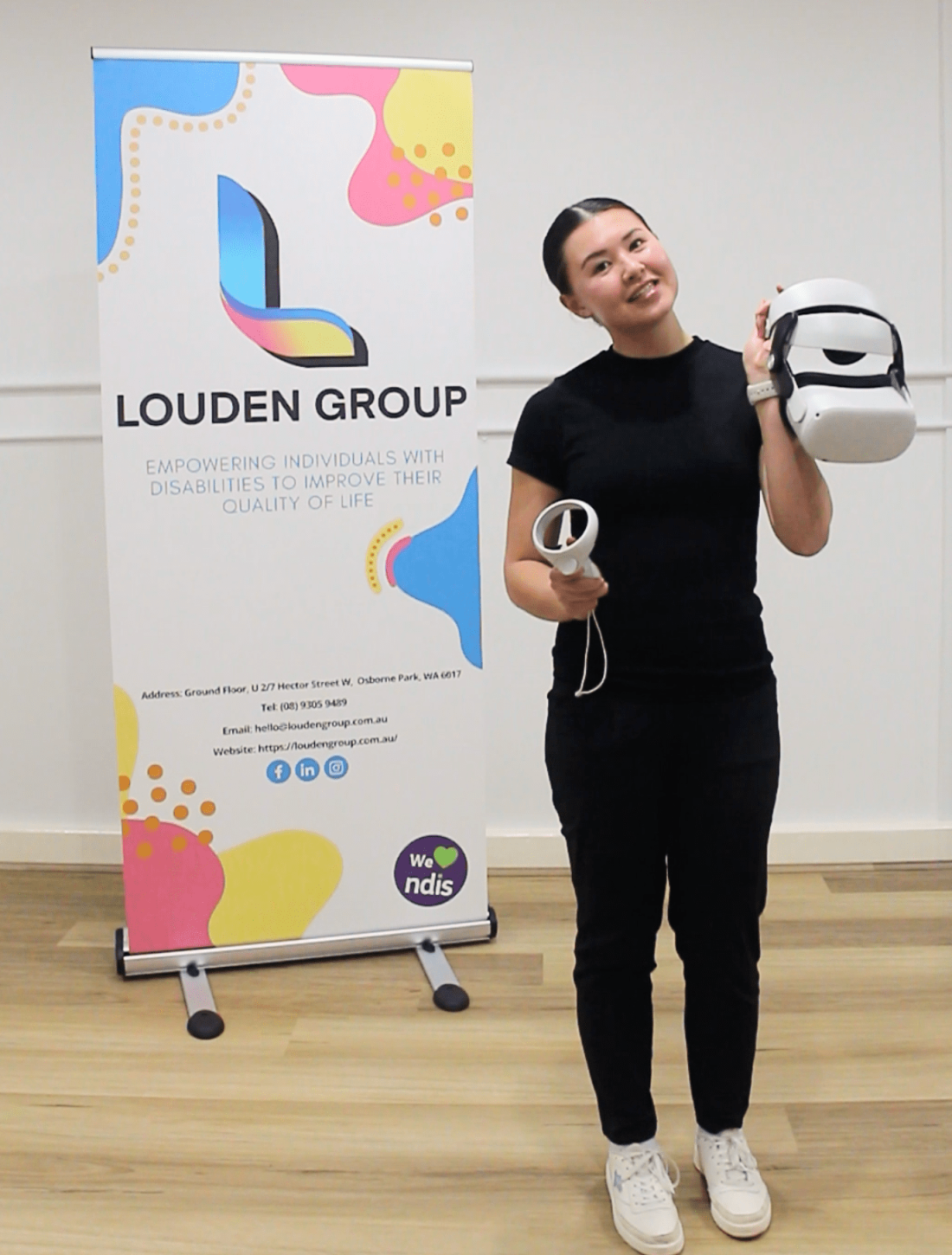
Discover the transformative power of VR therapy with Louden Group. Whether you’re keen to enhance your skills, support a loved one, or simply curious about the potential of virtual reality in the therapeutic world, now is the time to take action. Dive into a tailored, immersive experience designed to unlock newfound potentials and horizons. Don’t wait to be part of this innovative wave in therapy. Reach out to us today, and let’s embark on this transformative journey together. Your future self will thank you for taking this step. 🌟

